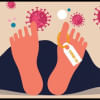Try 8 tips to quit smoking
Wednesday, May 31, 2017 is the World Health Organization's (WHO) annual World No Tobacco Day. For those planning on using the day as their quit date, we've rounded up eight top tips from the WHO to make 2017 the year you successfully quit smoking.

1. Set a quit date
Set a quit date for as soon as possible to help keep you focused and motivated on achieving your goal. It could be a date that is meaningful to you, such as a birthday, it could be World No Tobacco Day, or it could be today!
2. Tell your friends, family, and coworkers
Telling those around you that you intend to quit is a good way to surround yourself with support from others, and could even inspire others around you to do the same. Pairing up with a "quit buddy" will make both of you accountable and you can support each other.
3. Be prepared for challenges
Quitting smoking isn't easy. Remember there will be challenges along the way, especially during the critical first few weeks. This is the hardest phase due to the nicotine withdrawal symptoms you will experience while you try to give up smoking.
4. Remove tobacco products from your home and environment
If you remove smoking products from your environment, you will be less tempted to pick them up and start again. Make your home smoke-free, avoid smoking areas, and ask friends and family not to smoke around you.
5. Try cognitive-behavioral therapies
Cognitive-behavioral therapies can help you with some of the withdrawal symptoms that you will experience. Getting enough sleep, eating well, exercise, and drinking plenty of water can help with symptoms such as headaches, coughing, weight gain, and restlessness. Positive thinking, yoga, meditation can help deal with mood changes, insomnia and difficulty concentrating.
6. Try medication
Nicotine replacement therapies (NRTs) such as nicotine gum and patches are available over the counter and can help tide you over the first few weeks. Non-nicotine replacement therapies such as the medications Bupropion and Varenicline are available on prescription. Be sure to ask a health practitioner about recommended dosage, usage, and potential side effects.
7. Break the habit
Smoking is tied very closely with other everyday activities and habits such as eating, socializing with friends, or watching television. Try to break these connections to help you stick to your goal.
8. Don't let a relapse discourage you
Don't worry if you can't quit on the first go. It might take multiple attempts to kick the habit of smoking, but every time you try is a step in the right direction. Don't let a relapse knock your confidence -- use it to learn from your mistakes and help make your next attempt a success.

 For all latest news, follow The Daily Star's Google News channel.
For all latest news, follow The Daily Star's Google News channel. 








Comments